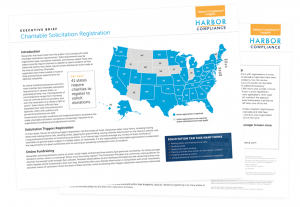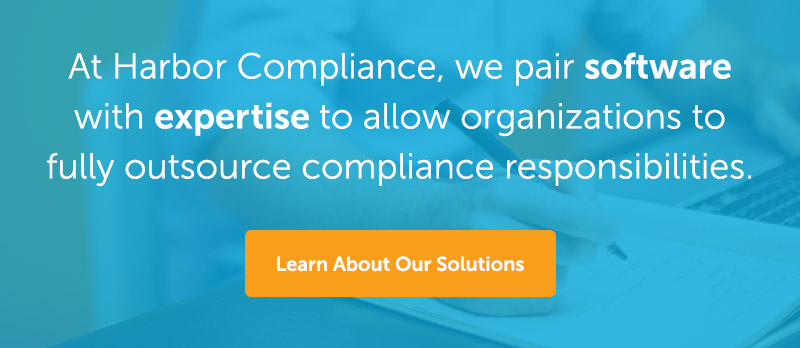-
Software
Compliance Software
Oversee licenses, track renewals, access documents, and more from a single interface.
Software Overview -
Services
Compliance Services
Full service compliance solutions for organizations throughout their entire lifecycles.
Services Overview -
Industries
-
Partner
- Information Center
Prioritizing Compliance: Avoid Risks and Achieve Better Fundraising
As you begin to discuss charitable solicitation registration within your organization, you will likely face a variety of questions. These questions may range from specifics about the requirements, to how they apply to your organization, to whether your nonprofit should bother to place any real priority on compliance.
We’re used to hearing all types of questions and facing initial apprehension from nonprofit leadership. Our goal is to help you become more informed so that you can educate your organization on the requirements. Better education helps you build consensus within your organization that compliance is necessary — and worth the investment.
We recognize that compliance does, in fact, require an investment — one that is not insignificant. We know that the requirements across 41 states are complex and registration requires an expenditure of funds that could be used elsewhere. But we are all too aware of the downsides of noncompliance and we see that risks are only growing. We believe strongly that the benefits of compliance make the costs of registration worthwhile.
This post will highlight some of those risks and benefits. We encourage you to share this information with your colleagues to help them better understand how charitable solicitation registration affects your organization.
Risks of Noncompliance
While many state agencies once served strictly as registration offices, their roles have expanded also to enforce charity regulations. States have added investigators, auditors, and prosecuting attorneys to their dedicated staff to help enforce state laws and fight fraud. In many states, the agency that processes charitable registrations is led by a prosecuting attorney, such as the Attorney General. State agencies exercise oversight over charitable solicitation activities in various ways, including regulation, investigation, and prosecution. While charitable solicitation is undeniably onerous on legitimate charities, it is necessary for protecting not only the public but also charities themselves.
The trend continues toward more regulation and enforcement. In some states, the powers afforded to state regulators have become far-reaching. For example, on January 1st of this year, changes to California’s laws took effect, which expanded the implications of the personal liability of members of boards of directors1. California now holds members personally responsible for penalties levied against suspended or revoked organizations. Penalties may no longer be paid out of the charity’s funds; instead, they must be paid with directors’ personal funds.
California is just one example of the broad powers that state regulators have to enforce charitable solicitation regulations. The risks and consequences of noncompliance are diverse, and include:
- State fines and penalties. States have the ability to levy hefty fines against noncompliant organizations and professional fundraising firms. In one example, South Carolina fined a professional firm $1,054,000 for alleged fundraising violations.2
- Enforcement actions and audits. Not only can state agencies initiate audits of an organization, but the IRS can also audit whether an organization has complied with disclosure requirements and fundraising solicitations.3
- Loss of state recognition of tax exemption. For example, the California Franchise Tax Board has the ability to revoke a charity’s state tax exemption for failure to file a registration or annual report with the Attorney General.4
- Revocation of right to solicit. Perhaps the worst consequence a charity can face is losing its ability to fundraise in a state altogether. New Jersey is just one of several states that may revoke or suspend a charity’s registration for failure to comply with registration requirements.5
- Director and officer liability. Nonprofit leadership can be held legally and financially responsible for their organization’s noncompliance. An example is the new laws in California that require penalties for revoked or suspended organizations to be paid by personal funds of the leadership.6
- Negative PR for the charity. In the event of a state investigation for noncompliance or potentially illegal behavior, charities can face a public relations nightmare. State governments, the media, and donors pick up on these activities. Even if a charity is cleared or resolves the issue, news of the investigation will remain on the Internet forever.7
- Embarrassment of board members. Negative publicity for a charity can bring bad publicity to its high-profile board members, as well. In one stark example, the Attorney General of Ohio himself faced embarrassment when he was on the board of a charity that was not registered to solicit in that state!8
- Missed grant and donation opportunities. Thirty-nine states have online search tools for donors and grantmakers to identify whether charities have registered. Many grants require that charities are registered for charitable solicitation in order to be eligible to apply. Some states, like Mississippi, publish public notices of legal actions against nonprofits including complaints, litigation, and settlements.9
Benefits of Compliance
Fundraising Without Borders
Charities have an obligation to be compliant in each state in which they fundraise. Organizations that fundraise in every state must generally register in each of the 41 states that require registration. Registering in all 41 states allows organizations to solicit donations by any method, including online, and apply for grant funding anywhere in the United States without the doubts and risks of noncompliance. Despite the effort and paperwork involved, many organizations find the benefits of full registration outweigh the costs.
Registering with the states and including the appropriate disclosures statements on solicitations help demonstrate an organization’s credibility and legitimacy. Studies show that charities that include disclosure statements on their solicitations get a better rate of return.10 Donors gain reassurance from the fact that an organization to which they wish to give is in compliance.
In addition, as individual donors, corporations, and foundations plan their own giving, actively researching charities is becoming more common. Donors can identify a charity’s registration status at any time with a quick Internet search or phone call to the state. With so many organizations out there soliciting and competing for donors’ attention, eliminating doubt and adding credibility are worthwhile objectives, which only add to the incentive of becoming compliant.
Compliance has practical considerations, too. Any time you apply for a grant, engage in partnerships, or solicit corporate sponsors for a high-dollar fundraising event, you can be expected to show proof of charitable registration in that state. Without the proper credentials, your staff may be confronted with an inflexible deadline to become registered, or you might lose the opportunity altogether. Now imagine the opposite — being registered everywhere you solicit, and being able to demonstrate that fact to anyone, at any time. That’s fundraising without borders!
Good-Faith Registration Avoids Penalties
A question that nonprofit leaders commonly have is whether registering would bring past noncompliance to light and lead to corrective actions. In the case of a charity having solicited in a state prior to registering, some nonprofits wonder if they should “let sleeping dogs lie.” We have not seen instances of states launching investigations into charities as a result of receiving their registration applications.
Certain states do assess financial penalties for late registration, however these will only continue to grow the longer a charity waits to register. We have not seen states pursue charities that register in good-faith beyond those penalties. Furthermore, it is better that a state finds out about late registration from the charity itself, rather than from a third-party, such as a concerned citizen. The best outcomes for avoiding adverse scenarios is by registering proactively, as stated by Karl Emerson, the former Pennsylvania Director of the Bureau of Charitable Organizations.11
“If you were coming in voluntarily, even if you had been violating the law for 10 or 15 years, you always got a pass… Bottom line is, you want to try to register voluntarily.”
While noncompliance comes with substantial risks, states prefer charities to register proactively so that they are in compliance. In a very basic sense, maintaining legal compliance is a best practice for nonprofits, and is a major area of the Standards for Excellence® code of ethics and accountability.12 Fundraising and licensing compliance are important aspects of running a lawful and responsible organization.
Investing in Compliance
While charitable registration can seem like a daunting project at first, the investment in compliance isn’t as monumental as it seems. Organizations should treat charitable solicitation requirements like any other legal requirement and prioritize them. Just as nonprofits make sure to file the IRS Form 990 each year, nonprofits should make sure to renew their charitable solicitations annually. Staying up-to-date on renewals keeps your organization in good standing and gives you the ability to focus your attention on your mission. After a while, these tasks will become almost second nature.
Compliance is a core responsibility of your leadership team and is integral to the success of your charity. Your board and charity are always in the public eye. By demonstrating your credibility to your donors and members, you’ll grow your base of support without fear of government scrutiny and the various consequences that come with it.
Take Action: Get your Leadership “on Board”
The first step towards compliance is sharing what you’ve learned with your executive leadership and ideally your board of directors, as well. Your organization’s leadership has a lot at stake, both personally and in terms of their duties as leaders of the organization. Many board members are not fully aware of the requirements, the risks of noncompliance, or the benefits of investing in compliance. Now that you understand these details, take initiative to start the conversation within your organization. Emphasize the importance on everyone becoming educated on the topic and advocate for prioritizing compliance.
We’ve prepared an Executive Brief to help you get your leadership up to speed quickly. Download the two-page Executive Brief, share it with your team, and spark a dialogue within your organization. Lastly, feel free to reach out to us anytime to discuss partnering with your organization!
Footnotes
- Notice of Adoption and Amendments to Regulations. (n.d.). Retrieved September 05, 2016, from https://oag.ca.gov/charities/notice-adoption-amend
- By South Carolina – The NonProfit Times. (n.d.). Fundraiser Is Fined $1.054 Million By South Carolina – The NonProfit Times. Retrieved September 05, 2016, from http://www.thenonprofittimes.com/news-articles/fundraiser-fined-1-054-million-south-carolina/
- Charity and Nonprofit Audits: Scope of Audits and Compliance Checks. (n.d.). Retrieved September 05, 2016, from https://www.irs.gov/charities-non-profits/scope-of-audits-and-compliance-checks-of-exempt-organizations
- CA Codes (rtc:). (n.d.). Retrieved September 05, 2016, from https://leginfo.legislature.ca.gov/faces/codes_displayText.xhtml?lawCode=CORP&division=1.&title=1.&part=&chapter=2.&article=
- Charitable Registration and Investigation Section Law. (2013, February 21). Retrieved September 05, 2016, from http://www.njconsumeraffairs.gov/Statutes/Charitable-Registration-and-Investigation-Act.pdf#page=21
- Notice of Adoption and Amendments to Regulations. (n.d.). Retrieved September 05, 2016, from https://oag.ca.gov/charities/notice-adoption-amend
- Butcher, A. (2015, October 13). Fundraising for Unregistered Charity: A Simple Mistake or Something More? Retrieved September 05, 2016, from https://nonprofitquarterly.org/2015/10/13/fundraising-for-unregistered-charity-a-simple-mistake-or-something-more/
- Emails show Ohio attorney general Mike DeWine held fundraisers for unregistered charity. (2014, November 24). Retrieved September 05, 2016, from http://fallsnewspress.com/latestheadlines/2014/11/24/emails-show-ohio-attorney-general-mike-dewine-held-fundraisers-for-unregistered-charity
- Enforcement Actions. (n.d.). Retrieved September 05, 2016, from http://www.sos.ms.gov/Pages/Enforcement-Actions.aspx
- Emerson, C. (2012, March 10). Understanding PA Charitable Solicitation Statute. Retrieved September 05, 2016, from http://www.lcfa.com/clientuploads/Resource_Center/Reports/Charitable_Organizations_Report.pdf
- Emerson, C. (2012, March 10). Understanding PA Charitable Solicitation Statute. Retrieved September 05, 2016, from http://www.lcfa.com/clientuploads/Resource_Center/Reports/Charitable_Organizations_Report.pdf
- Standards for Excellence of Nonprofit Organizations. (n.d.). Retrieved September 05, 2016, from https://standardsforexcellence.org/










